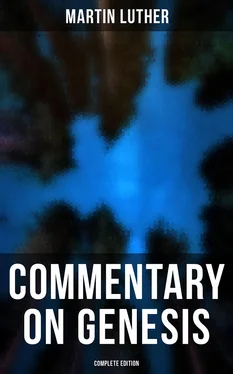Martin Luther - Commentary on Genesis (Complete Edition)
Здесь есть возможность читать онлайн «Martin Luther - Commentary on Genesis (Complete Edition)» — ознакомительный отрывок электронной книги совершенно бесплатно, а после прочтения отрывка купить полную версию. В некоторых случаях можно слушать аудио, скачать через торрент в формате fb2 и присутствует краткое содержание. Жанр: unrecognised, на английском языке. Описание произведения, (предисловие) а так же отзывы посетителей доступны на портале библиотеки ЛибКат.
- Название:Commentary on Genesis (Complete Edition)
- Автор:
- Жанр:
- Год:неизвестен
- ISBN:нет данных
- Рейтинг книги:4 / 5. Голосов: 1
-
Избранное:Добавить в избранное
- Отзывы:
-
Ваша оценка:
- 80
- 1
- 2
- 3
- 4
- 5
Commentary on Genesis (Complete Edition): краткое содержание, описание и аннотация
Предлагаем к чтению аннотацию, описание, краткое содержание или предисловие (зависит от того, что написал сам автор книги «Commentary on Genesis (Complete Edition)»). Если вы не нашли необходимую информацию о книге — напишите в комментариях, мы постараемся отыскать её.
Commentary on Genesis is the last work of Martin Luther, written during the last several years of his life. Luther's work follows the first volume of Psalms with critical and devotional remarks on the creation and on sin and the flood.
Commentary on Genesis (Complete Edition) — читать онлайн ознакомительный отрывок
Ниже представлен текст книги, разбитый по страницам. Система сохранения места последней прочитанной страницы, позволяет с удобством читать онлайн бесплатно книгу «Commentary on Genesis (Complete Edition)», без необходимости каждый раз заново искать на чём Вы остановились. Поставьте закладку, и сможете в любой момент перейти на страницу, на которой закончили чтение.
Интервал:
Закладка:
The cold and wicked cavilling of the Jews therefore is to be altogether exploded, when they say that Moses used the plural number for the sake of reverence. For what place is there here for the exercise of reverence? Especially since that which is an idiom among us Germans is not common to all languages; namely, that it should be considered a point of reverence to use the plural number when speaking of one person.
Although the Jews make so much noise about this term ELOHIM being applied to angels and to men, be it remembered that it is in the plural number in this place where it cannot possibly be applied to any but the one true God, because Moses is treating of the Creation. There were moreover many other singular nouns which Moses might have used had he not purposely intended to show to the spiritually minded, that in the divine nature there is before and independently of all creation and all creatures, a plurality of persons. He does not indeed say in plain terms, there is the Father, there is the Son, and there is the Holy Ghost; and they are the one true God; because that was reserved for the doctrine of the Gospel. It was enough for him by the use of a plural noun though afterwards applied to men also, to set forth this plurality of the divine persons.
Nor ought it to offend us that this same term is afterwards applied to creatures. For why should not God communicate his name unto us, seeing that he communicates to us his power, and his office? For us to remit sins, to retain sins, to quicken to spiritual life, etc., are the works of the divine Majesty alone; and yet these same works are a sign to men and they are wrought by the Word which men teach. Thus Paul said, "That I may save some of them that are my flesh," Rom. 11:14. And again, "I am become all things to all men, that I may by all means save some," 1 Cor. 9:22. As therefore these works are truly the works of God, although they are assigned also unto men and are wrought by means of men; so the name of God truly represents God though it is applied also to men.
Arius could not deny that Christ existed before the world was created, because Christ himself says, "Before Abraham was, I am," John 8:58. It is written in the Proverbs, 8:22, also, "Before the heavens were, I am." Arius is obliged therefore to confess that Christ or the Word was created before all things, and that he afterwards created all things, and that he was the most perfect of all creatures though he did not exist from everlasting. But to this fanatical and impious opinion we ought to oppose that which Moses so briefly expresses by the term "In the beginning." Nor does Moses place anything before "the beginning" but God himself; and him he here represents by a plural noun.
Into these absurd opinions do minds fall when they speculate on such mighty things without the Word. We know not ourselves; as Lucretius says, "Man knows not the nature of his own soul." We feel that we can judge, enumerate, distinguish quantities, and, if I may so call them, spiritual creatures, such as truth and falsehood, and yet we cannot to this day define what the soul is. How much less then shall we be able to understand the divine nature! We know not for instance what is the motion of our will; for it is not a motion of quality or of quantity; and yet it is some motion. What then can we know of things divine?
It is fanatical therefore to dispute concerning God and the divine nature without the Word and without some veiling representation. Yet thus do all heretics; and they think and dispute respecting God with the same security as they would respecting a hog or a cow. Therefore they receive a reward worthy their temerity; for by these means they are dashed on the rocks of every peril. Hence he who would contemplate such mighty things in safety and without danger must confine himself with all simplicity within those representations, signs and veils of the divine Majesty, his word and his works. For it is in his word and his works that he reveals himself unto us; and such as attain unto the knowledge of these are like the woman laboring under the issue of blood, healed by touching these hems of his garment.
Those on the other hand who strive to reach God without these veils and coverings, attempt to scale heaven without a ladder, that is, without the Word; and in so doing are overwhelmed by the majesty of God, which they vainly endeavor to comprehend, and they fall and perish. And so it befell Arius. He conceived the imagination that there was some medium between the Creator and the creature; and that by that medium all things were created. Into this error he necessarily fell the moment he denied contrary to the Scriptures a plurality of persons in the divine nature. But as he discussed these things without the Word of God and depended solely on his own cogitations, he could not but be thus dashed to pieces.
Thus the monk of the Papists, because he follows not the Word, imagines such a God to be sitting in heaven as will save any one who is covered with a cowl and observes a certain strict rule of life. Such a one also attempts to ascend into heaven by his own cogitations without God as revealed in his Word, or without the revealed face of God for his guide. Thus also the Jews had their idols and their groves. The fall and the destruction of all are alike. They are precipitated and dashed to pieces; because every one leaving the Word follows his own imaginations.
If therefore we would walk safely we must embrace those things which the Word teaches, and which God himself has willed us to know; and all other things which are not revealed in the Word we must leave. For what are those things to me, which God did before the world was made, or how can I comprehend them? This is indulging thoughts upon the naked Divinity. And these are the thoughts by which the Jews suffer themselves to be led away from this text; and which thus prevent them from believing in a plurality of persons in the deity; whereas it is evident that Moses employs a plural noun.
The papal decree condemned the Anthropomorphists (manlikeners), because they spoke of God as they would of a man, and attributed to him eyes, ears, arms, etc. An unjust condemnation truly! For how otherwise can man talk with man concerning God? If to think thus of God be heresy; then for a certainty is the salvation of all children, who can only think and speak thus as children concerning God, at an end for ever. But to say nothing about children, give me the most learned doctor in all the world; how otherwise will even he speak and teach concerning God?
An injury therefore was thereby done to good men; who, though they believed God to be omnipotent and the only Saviour, yet were condemned merely because they said God has eyes by which he looks upon the poor and needy, and ears by which he listens to their prayers. For how otherwise can this our nature understand the spiritual reality of God. Moreover the Scriptures use this form of speech. Wherefore such were undeservedly condemned. They should rather have been lauded for the simplicity which they studied; which is so requisite in all teaching. It is absolutely necessary that when God reveals himself unto us, he should do so under some veil of representation, some shadowing manifestation, and should say, "Behold under this veil thou shalt surely discover me." And when we embrace God under this veil or shadow, when we thus adore him, call upon him, and offer to him our sacrifices, we are said rightly to offer our sacrifices unto God!
It was thus doubtless that our first parents worshipped God. In the morning when the sun rose they adored the Creator in the creature; or to speak more plainly they were by the creature reminded of the Creator. Their posterity retained the custom, but without the knowledge; and hence the custom lapsed into idolatry. The cause of this idolatry was not the sun; for he is a good creature of God; but the knowledge and the doctrine became by degrees extinct; for Satan cannot endure true doctrine. Thus when Satan had drawn Eve from the Word, she fell immediately into sin.
Читать дальшеИнтервал:
Закладка:
Похожие книги на «Commentary on Genesis (Complete Edition)»
Представляем Вашему вниманию похожие книги на «Commentary on Genesis (Complete Edition)» списком для выбора. Мы отобрали схожую по названию и смыслу литературу в надежде предоставить читателям больше вариантов отыскать новые, интересные, ещё непрочитанные произведения.
Обсуждение, отзывы о книге «Commentary on Genesis (Complete Edition)» и просто собственные мнения читателей. Оставьте ваши комментарии, напишите, что Вы думаете о произведении, его смысле или главных героях. Укажите что конкретно понравилось, а что нет, и почему Вы так считаете.












